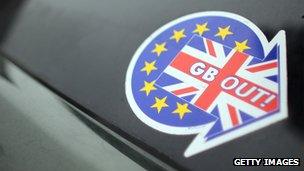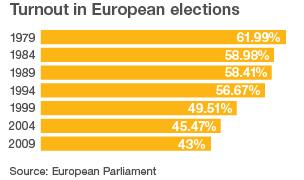Europe and the anti-establishment vote
- Published
- comments

Eurosceptic UKIP has stoked heated debate about Britain's EU membership
The recent success of UKIP in the English local elections caused barely a ripple in the rest of Europe. Yet the poll served as a reminder of another more important fight which lies ahead and is getting closer.
Elections will be held to the European Parliament between 22 and 25 May 2014.
Privately European officials concede this could prove another challenge for the European project. The reason is the rise of anti-establishment parties, suspicious or even hostile towards Brussels.
The turnout in European elections has been steadily falling. It was 43% in 2009. The poll, in some countries, is seen as an opportunity to make a protest or to punish a national government in office at the time.
In the past this did not matter so much. The European Parliament had less weight, but the Lisbon Treaty has given it more power and, recently, it has been more assertive.
The parliament has taken the lead over capping bankers' bonuses. MEPs like Othmar Karas and Philippe Lamberts have become significant players in the field of financial regulation. Arlene McCarthy, Labour MEP for the North West, has become influential in restructuring the EU's banking sector and in proposing a financial transaction tax. Sharon Bowles, Lib Dem MEP for the South East of England, chairs the increasingly important Economic and Monetary Affairs Committee. Leading MEPs like Guy Verhofstadt and Hannes Swoboda have been outspoken on the eurozone crisis.
The importance of their voices reflects the growing influence of the European Parliament. The fear among EU officials is that after next year's elections the parliament will have a significant number of new MEPs carried to Brussels on the votes of the disillusioned.
Voter anger spreads

Recession and austerity have left the mood in Europe fractious. It is reflected in the rise in Italy of the anti-establishment Five Star Movement, which was the success story in the recent Italian elections.
Five Star's appeal was its demand for radical reform of the Italian political culture, but its leader Beppe Grillo has also questioned remaining in the eurozone.
The movement's new MPs have stayed outside government and they expect the newly-formed coalition to be short-lived and to reap the benefits in future elections.
In France, with a stagnant economy and an unpopular president, the polls suggest a rise in popularity of Profile: Marine Le Pen and her National Front. In one poll she was seen as making it through to the final round of a presidential poll if it were held now. She is outspoken in blaming austerity on Europe. "France," she said, "is sinking into an absurd policy of endless austerity because it is always about saying yes to Brussels".
In Greece, the radical left party Syriza, which is highly critical of the austerity policies of the current coalition in Athens, may well be able to tap into the discontent with an economy which is shrinking for the sixth year in a row.
Even in Germany the new Alternative for Germany party, which is demanding repatriation of some legislative powers from Brussels, may spy an opportunity in the European elections.
Hoping for growth
It is a race against time, says one senior EU official. He predicted a few months ago that the EU had two years at most to restore growth or all bets are off.
The hope in Brussels is that by May next year growth will have re-emerged and that there are the first signs of employment rising. The key, I was told, is that however weak the green shoots may appear, a corner appears to have been turned.
It will be a close run. The return of growth is being pushed further into the future. Currently France, Italy and Spain are all reporting a decline in manufacturing output. Only yesterday (Monday) the forecast was for Italy's economy to shrink 1.4% this year and to grow by 0.7% next year, but for unemployment to continue rising.
Come next May unemployment may still be rising in Greece and Spain.
The European elections are yet another reason why those countries seeking more time to balance their public accounts and reduce their deficits are likely to find a sympathetic ear in Brussels. Also don't expect the elections to be as before. Some very senior voices are planning to characterise the vote as about the future of Europe.